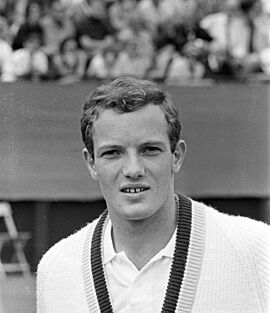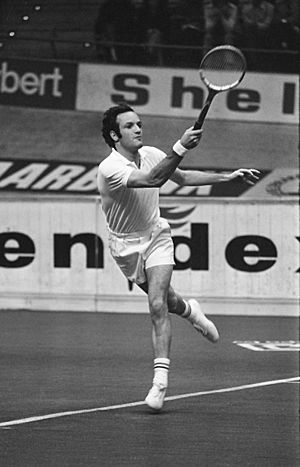Tom Okker facts for kids
 |
|||||||||||||||||
| Full name | Thomas Samuel Okker | ||||||||||||||||
|---|---|---|---|---|---|---|---|---|---|---|---|---|---|---|---|---|---|
| Country (sports) | |||||||||||||||||
| Residence | Hazerswoude-Dorp, Netherlands | ||||||||||||||||
| Born | 22 February 1944 Amsterdam, Netherlands |
||||||||||||||||
| Height | 1.77 m (5 ft 10 in) | ||||||||||||||||
| Turned pro | 1968 (amateur from 1964) | ||||||||||||||||
| Retired | 1981 | ||||||||||||||||
| Plays | Right-handed (one-handed backhand) | ||||||||||||||||
| Prize money | $1,257,200 | ||||||||||||||||
| Singles | |||||||||||||||||
| Career record | 798–335 (70.43%) in pre Open-Era & Open Era | ||||||||||||||||
| Career titles | 39 (35 listed by ATP) | ||||||||||||||||
| Highest ranking | No. 3 (2 March 1974) | ||||||||||||||||
| Grand Slam singles results | |||||||||||||||||
| Australian Open | SF (1971) | ||||||||||||||||
| French Open | SF (1969) | ||||||||||||||||
| Wimbledon | SF (1978) | ||||||||||||||||
| US Open | F (1968) | ||||||||||||||||
| Other tournaments | |||||||||||||||||
| Tour Finals | F (1973) | ||||||||||||||||
| WCT Finals | SF (1971) | ||||||||||||||||
| Doubles | |||||||||||||||||
| Career record | 550–152 | ||||||||||||||||
| Career titles | 68 | ||||||||||||||||
| Highest ranking | No. 1 (5 February 1979) | ||||||||||||||||
| Grand Slam doubles results | |||||||||||||||||
| Australian Open | F (1971) | ||||||||||||||||
| French Open | W (1973) | ||||||||||||||||
| Wimbledon | F (1969) | ||||||||||||||||
| US Open | W (1976) | ||||||||||||||||
|
Medal record
|
|||||||||||||||||
Thomas Samuel Okker (born 22 February 1944) is a famous Dutch former tennis player. People often called him "the Flying Dutchman" because of his speed on the court. He played tennis from the mid-1960s until 1980.
Tom Okker won important titles like the 1973 French Open Doubles and the 1976 US Open Doubles. He also earned two gold medals at the 1965 Maccabiah Games in Israel. He was one of the top ten singles players in the world for seven years in a row, from 1968 to 1974. His highest singles ranking was world No. 3 in 1974. He also became the world No. 1 in doubles in 1979.
Contents
Early Life and Background
Okker was born in Amsterdam, Netherlands. His father was Jewish, and Tom Okker also identifies as Jewish. During World War II, his father was held captive by the Nazis. However, he managed to escape by pretending to be someone else.
Tom Okker's Tennis Career
Tom Okker started his tennis journey in 1963 in West Germany. He was the best tennis player in the Netherlands, winning the Dutch championship every year from 1964 to 1968.
In 1968, he became a professional player. That year, he won both singles and doubles titles at the Italian Open. His doubles partner was Marty Riessen. At Wimbledon, Okker reached the quarterfinals in 1968 and the semifinals in 1978.
His best result in a major tournament, called a Grand Slam, was at the 1968 US Open. He made it to the final match. Along the way, he beat famous players like Pancho Gonzales and Ken Rosewall. He lost the final to Arthur Ashe in a very close five-set match. Okker received the prize money because Ashe was still an amateur player at that time.
Throughout his career, Tom Okker won 39 singles titles. He also reached the final in 39 other singles tournaments.
Doubles Success
Tom Okker is known as one of the most successful doubles players ever. He won two Grand Slam doubles titles. He won the US Open in 1976 with Marty Riessen. He also won the French Open in 1973 with John Newcombe.
In total, Okker won 68 doubles events. This was a world record for men's doubles titles until Todd Woodbridge broke it in 2005. Okker won many other doubles tournaments too, including the Italian Open and the London Grass Courts.
He was one of the first tennis professionals to earn over $1 million in prize money. When he stopped playing in 1980, his total earnings were $1,257,200.
Davis Cup Matches
From 1964 to 1981, Tom Okker played for the Netherlands in the Davis Cup. This is a big international team tennis competition. He played in 13 matches for his country.
Maccabiah Games Achievements
In 1965, Okker won two gold medals at the 1965 Maccabiah Games in Israel. He won the men's singles title and the mixed doubles title. The Maccabiah Games are a special sports event for Jewish athletes from all over the world.
Playing Style
Tom Okker was one of the first players of his time to hit the ball with heavy topspin. This means he made the ball spin forward very fast, which made it harder for his opponents to return.
Halls of Fame
In 2003, Tom Okker was honored by being added to the International Jewish Sports Hall of Fame. He was also considered for the International Tennis Hall of Fame in 2018, but he was not chosen that year.
Personal Life
Tom Okker is married to Anna-Marie, and they have three children. Since the mid-1980s, Okker has been very involved in art. He helped start the Jaski art gallery in Amsterdam. This gallery specializes in art from the CoBrA movement. In 2005, he opened his own art gallery, Tom Okker Art bv, in Hazerswoude-Dorp, Netherlands, where he lives today.
Grand Slam Finals
Singles Final: 1 (1 Runner-up)
| Result | Year | Championship | Surface | Opponent | Score |
|---|---|---|---|---|---|
| Loss | 1968 | US Open | Grass | 12–14, 7–5, 3–6, 6–3, 3–6 |
Doubles Finals: 5 (2 Titles, 3 Runner-ups)
| Result | Year | Championship | Surface | Partner | Opponents | Score |
|---|---|---|---|---|---|---|
| Loss | 1969 | Wimbledon | Grass | 5–7, 9–11, 3–6 | ||
| Loss | 1971 | Australian Open | Grass | 2–6, 6–7 | ||
| Win | 1973 | French Open | Clay | 6–1, 3–6, 6–3, 5–7, 6–4 | ||
| Loss | 1975 | US Open | Grass | 4–6, 6–7 | ||
| Win | 1976 | US Open | Grass | 6–4, 6–4 |
See also
 In Spanish: Tom Okker para niños
In Spanish: Tom Okker para niños
- List of select Jewish tennis players
 | William L. Dawson |
 | W. E. B. Du Bois |
 | Harry Belafonte |


